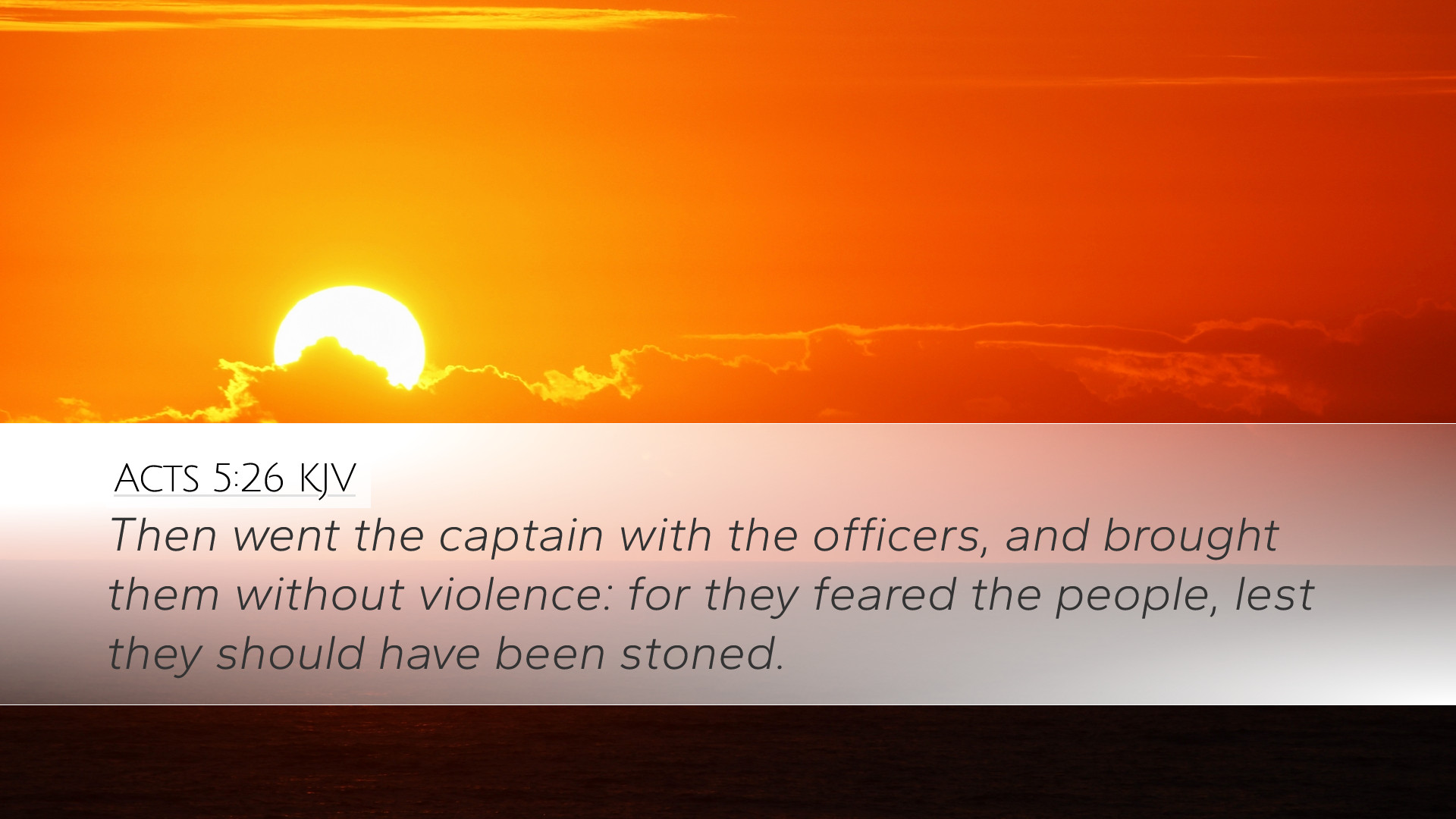Commentary on Acts 5:26
Verse Text: "Then went the captain with the officers, and brought them without violence; for they feared the people, lest they should have been stoned."
Contextual Background
The context of Acts 5:26 is critical for understanding this verse's significance. The early Church was experiencing unprecedented growth, and with it came persecution from the Jewish authorities. The apostles had been preaching actively in Jerusalem, and signs and wonders were accompanying their ministry. This drew the ire of the Sanhedrin, prompting them to imprison the apostles, as seen in the preceding verses.
Insights from Public Domain Commentaries
Matthew Henry's Commentary
Matthew Henry provides profound insights into this verse, noting that the captain of the temple and his officers demonstrated both authority and restraint. Henry emphasizes that the officers approached without violence, highlighting the tension between the authorities and the public sentiment favoring the apostles.
- Fear of the People: Henry points out that the captain's fear of a violent backlash from the people reflects the growing influence of the apostles among the masses. This factor illustrates that the early Christians were gaining credibility and support, which made the authorities cautious.
- Role of Divine Providence: The verse also underscores the sovereignty of God in the unfolding events. While the authorities intended to suppress the apostles, God's presence protected them, suggesting that the work of the Holy Spirit was undeniably at play.
Albert Barnes' Notes on the Bible
Barnes highlights the carefulness with which the captain and officers handled the situation, noting that they did not use excessive force. The reluctance to act violently against the apostles shows their awareness of how the people viewed the apostles' ministry.
- Political Implications: According to Barnes, this incident reflects a significant intersection of politics and religion, where the authorities were more concerned about public opinion than they were about enforcing the law. This phenomenon remains relevant today, as leaders often navigate their power dynamics in light of popular sentiment.
- Theme of Divine Protection: Barnes also suggests that the restraint shown by the captain was a practical realization that the apostles had a divine purpose. Their inability to be stoned or harmed symbolized God's overarching plan at work.
Adam Clarke's Commentary
Adam Clarke provides a detailed analysis of the motivations behind the captain's actions. He remarks that the captain of the temple had a role that included maintaining order and ensuring the safety of the temple precincts. His decision to bring the apostles without violence highlights a bureaucratic caution that impacted their legal proceedings.
- Power Dynamics: Clarke points out the shifting power dynamics between the Jewish leaders and the burgeoning Christian movement. The authorities' fear reflects a recognition of the apostles' influence, which was growing to the point of challenge against the established religious order.
- The Role of Fear as a Tool: Clarke elaborates on the idea of fear as a significant tool that the Jewish authorities wielded. They feared the repercussions not just from the populace but also the potential divine implications of interfering with God’s chosen messengers.
Theological Reflections
This verse invites theological reflection on the themes of divine authority and human governance. The fear exhibited by the captain illustrates the tension between God's sovereignty and human authority.
- God's Sovereignty: Acts 5:26 is a testament to the fact that God’s plans ultimately prevail, even against the backdrop of human authority and fear. It reaffirms that nothing happens outside of God's control, and that He can protect His servants in the face of adversity.
- The Nature of True Authority: The captain's actions exemplify a form of humility that contrasts the arrogance often seen in power structures. Leaders today can learn from this model of careful consideration of their influence over others, especially in matters of faith.
- Challenges of Leadership: This passage also illustrates the complexities that leaders face when their decisions must balance personal convictions against public sentiment. It poses challenging questions about how leaders respond to popular movements of faith within their communities.
Conclusion
In summary, Acts 5:26 encapsulates a profoundly meaningful moment in the early Church, illustrating the dynamics between divine authority and human governance. Through the insights of respected commentaries, we understand that the captain acted out of fear that reflected a larger spiritual reality at play. For pastors, students, theologians, and scholars, this passage encourages deeper contemplation about the relationship between faith and public authority, the power of God to protect His followers, and the ongoing influence of the Church in society.


